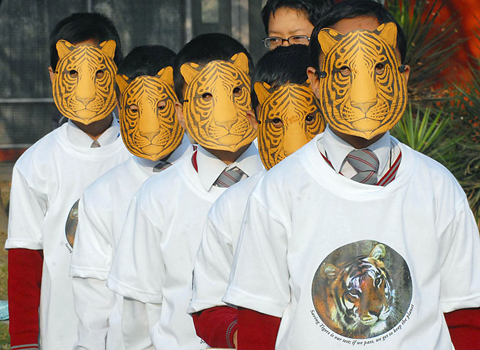Next year is the Year of the Tiger in the Chinese calendar, but conservationists say the omens are inauspicious for an animal on the brink of extinction.
If anything, the tiger’s year in the Chinese zodiac may hasten its demise, conservationists fear, with festive demand for its skin and body parts encouraging poachers to hunt the few animals that still remain in the wild.
“The Year of the Tiger will put more pressure on wild tigers,” Michael Baltzer, head of the WWF Tiger Initiative, said during a tiger conservation conference held in Kathmandu which wound up on Friday.

PHOTO: EPA
“The use of tiger parts in traditional Chinese medicine has fallen, but the trend of giving tiger parts as gifts and souvenirs is growing,” Baltzer said, adding that he expected this demand to increase next year.
“There is a certain consumer group who want to use tiger parts to show how wealthy they are, as a status symbol, and this group of people is increasing,” he said.
Experts from the lobby group Save the Tiger Fund estimate that only 3,200 tigers survive in the wild, down from 100,000 a century ago, mainly because of poaching and loss of habitat in south and southeast Asia.
Although tiger hunting is illegal worldwide and the international trade in tiger parts is banned under a treaty binding 167 countries — including China — experts say the illicit trade is still flourishing.
Despite officially banning the trade in tiger body parts in 1993, China has 6,000 tigers on 14 farms across the country, said Li Zhang, program director of Conservation International in Beijing.
These farms are able to produce about 1,000 cubs annually.
China has been pushing for an agreement to resume trade in tiger products and delegates at Kathmandu conference say its officials raised the issue at the conference.
Chinese officials at the conference, which was organized by the Global Tiger Initiative, an alliance of governments, NGOs and the private sector, declined to comment to the media.
Tiger skins, which fetch high prices in China and elsewhere in Asia, are used for furniture and decoration, while body parts are used in traditional medicine and aphrodisiacs. In China, the animal is also a symbol of power, energy and bravery, as well as good luck.
Huang Lixin, president of the American College of Traditional Chinese Medicine in San Francisco, said in Kathmandu that the threat to tigers posed by the Year of the Tiger, which will start on Feb. 14, was real.
“Owning tiger skins in China is becoming a status symbol, a luxury item,” she said. “Chinese consumers will want tiger bones or tiger wine and liquor, or tiger skins, to celebrate the year.”

ELECTION DISTRACTION? When attention shifted away from the fight against the militants to politics, losses and setbacks in the battlefield increased, an analyst said Recent clashes in Somalia’s semi-autonomous Jubaland region are alarming experts, exposing cracks in the country’s federal system and creating an opening for militant group al-Shabaab to gain ground. Following years of conflict, Somalia is a loose federation of five semi-autonomous member states — Puntland, Jubaland, Galmudug, Hirshabelle and South West — that maintain often fractious relations with the central government in the capital, Mogadishu. However, ahead of elections next year, Somalia has sought to assert control over its member states, which security analysts said has created gaps for al-Shabaab infiltration. Last week, two Somalian soldiers were killed in clashes between pro-government forces and

Ten cheetah cubs held in captivity since birth and destined for international wildlife trade markets have been rescued in Somaliland, a breakaway region of Somalia. They were all in stable condition despite all of them having been undernourished and limping due to being tied in captivity for months, said Laurie Marker, founder of the Cheetah Conservation Fund, which is caring for the cubs. One eight-month-old cub was unable to walk after been tied up for six months, while a five-month-old was “very malnourished [a bag of bones], with sores all over her body and full of botfly maggots which are under the

BRUSHED OFF: An ambassador to Australia previously said that Beijing does not see a reason to apologize for its naval exercises and military maneuvers in international areas China set off alarm bells in New Zealand when it dispatched powerful warships on unprecedented missions in the South Pacific without explanation, military documents showed. Beijing has spent years expanding its reach in the southern Pacific Ocean, courting island nations with new hospitals, freshly paved roads and generous offers of climate aid. However, these diplomatic efforts have increasingly been accompanied by more overt displays of military power. Three Chinese warships sailed the Tasman Sea between Australia and New Zealand in February, the first time such a task group had been sighted in those waters. “We have never seen vessels with this capability

‘NO INTEGRITY’: The chief judge expressed concern over how the sentence would be perceived given that military detention is believed to be easier than civilian prison A military court yesterday sentenced a New Zealand soldier to two years’ detention for attempting to spy for a foreign power. The soldier, whose name has been suppressed, admitted to attempted espionage, accessing a computer system for a dishonest purpose and knowingly possessing an objectionable publication. He was ordered into military detention at Burnham Military Camp near Christchurch and would be dismissed from the New Zealand Defence Force at the end of his sentence. His admission and its acceptance by the court marked the first spying conviction in New Zealand’s history. The soldier would be paid at half his previous rate until his dismissal